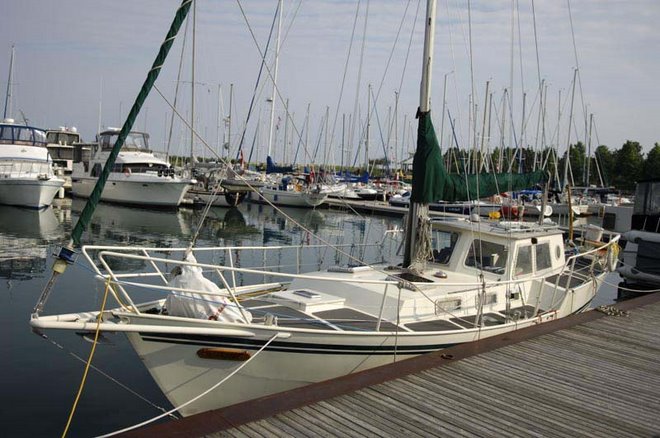Considering there is no fuel supply hooked up, and I can only assume there are ENSIS fumes in the cylinders, or maybe a few millilitres of diesel from a factory test firing, I am rather pleased with the eagerness displayed. Actual fuel supply and picture-heavy post on How I Got Here to follow shortly.
| Just for the initial run-in at dock, mind. |




7 comments:
Lovely start. Very promising. Now only add fuel, easy peasy.
The fuel setup will be temporary only, for the very good reason that there's 100 gallons of "placekeeping" diesel aboard that, being intended only to keep the tanks unrusted, is probably not worth attempting to burn. Not without installing my shiny new filter system first. So I will run just to ensure I can (and to get to the wall at haulout, which will quieten the peanut gallery for a change), and to drive the boat to a place where I can have the tanks purged and fresh diesel thrown in.
You would have laughed, John: today I had the fire extinguisher at the ready and the safety glasses on, and I didn't even expect it to actually start. I just wanted to spin the starter a couple of times to confirm my wiring. So I suppose today was a confidence builder for The Boy Who Didn't Take Shop Class.
The Boy Who Didn't Take Shop Class is doing really well. He could actually teach a lot of people about boat maintenance and particularly about engine setup and maintenance. I wonder how one could get rid of 100 gallons of old diesel. I agree, it's better to have it in the tank, because diesel is an oil. But then what does one do with vintage diesel. It's not exactly an old, drinkable, claret or merlot, is it?
Thank you, John. Actually, I have been led to believe that the diesel sitting dormant in my tanks may be actually burnable if put through a dockside fuel polisher. I will let it act as expensive rustproofing this winter and will explore this possibility in the spring. The theory is that diesel has far fewer additives and "volatiles" to more or less perish and therefore is intrinsically more stable, particularly when left in the cool dark, as has mine, for the most part.
Donate the 100 gallons of place keeping diesel to a commercial vessel in the harbour such as a tour boat.They have such large tanks and so much fuel that your (older) diesel will be well diluted when added to their existing fuel. Most commercial boats filter at 10 microns and will be easily able to tolerate your old fuel and they'll certainly appreciate the gift. That's what we did with our 20 gallons of diesel which was too brown to get through our 2 micron filters. The commercial offshore fishing boat wasn't phased at all by our reports of 'dirty" fuel.
Make an opaque cover of some sort for your engine panel. Dark coloured Sunbrella? The LCD hour meter and other gauges will thank you. The tropical sun is murder on LCD screens.
Actually, Ken + Lynn, I may be able to use the 100 gallons myself. We'll see in the spring, but that's what I've been told: polish at the dock, and then run it through my own Filter Boss.
As for the opaque cover, it's a good idea. There is no direct sun on the helm except from the 5 x 12 inch hatch above the helm station in the pilothouse roof. Making some sort of cover with snaps would be pretty easy. Thank you for the tip. I may put the temporary fuel supply together tomorrow if I can ditch paying work.
Post a Comment